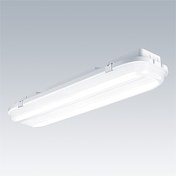ForceLED / FORCELED 7000 840 BC
92984191
▼ Datenblatt
Eine kompakte, staub- und feuchtigkeitsfeste LED-Leuchte, IP66. Vorschaltgerät: Elektronisches, Drahtlose Verbindung via App mit Bluetooth® 4.x - basicDIM Wireless. Schutzklasse I, IK10. Leuchtendach: Aluminium, vollständig recycelbar, weiß lackiert. Diffusor: Polycarbonat (PC), UV-stabilisiert, mit innenliegenden Längsprismen. Clips: Edelstahl. Zur Aufputz- , BESA- oder Hängemontage. Schnellbefestigungen für die Aufputzmontage im Lieferumfang. Sets zur Ketten-, Spannseil- oder Tragschienenmontage sind als Zubehör erhältlich. Drahtlose Verbindung via App mit Bluetooth® 4.x - basicDIM Wireless Inklusive LED-Modul mit 4000K
Funk Definition: basicDIM Wireless - Bluetooth® 4.x, Funk Frequenz: 2,4 GHz, Funk Sendeleistung: +4dBm.
Umgebungstemperatur: -20°C bis +40°C
Abmessungen: 735 x 180 x 95 mm
Leuchten Leistung: 50,1 W
Leuchten Lichtstrom: 7000 lm
Leuchten Lichtausbeute: 140 lm/W
Gewicht: 3,1 kg
- LED
- CE
- D
- Food
- GLedReP
- 850°
- Halogenfrei
- IK10
- IP66
- LLedNr
- Schutzklasse 1
- Ta=-20°C_to_+40°C

